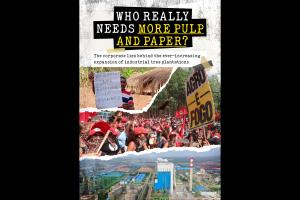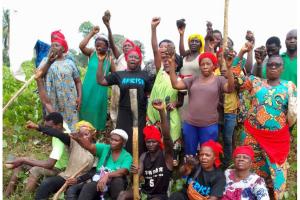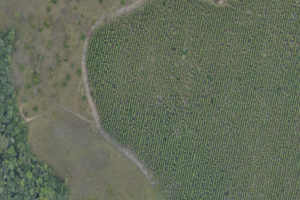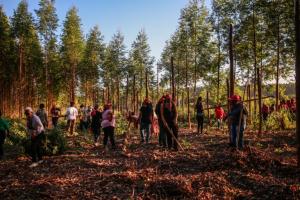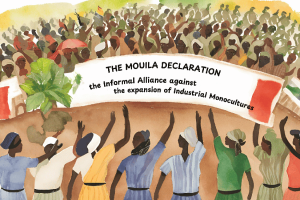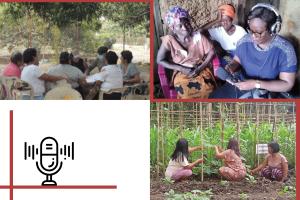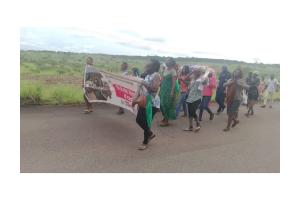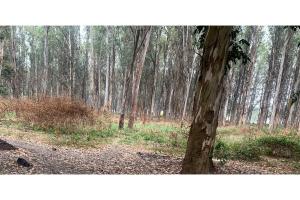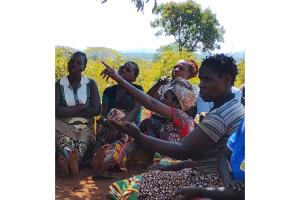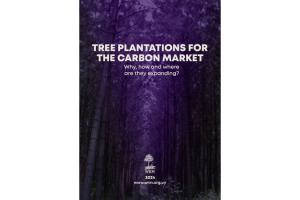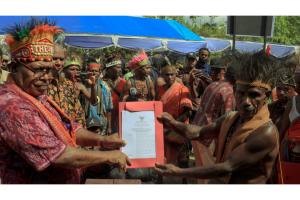This 21 September, International Day of Struggle Against Monoculture Tree Plantations, we stand in solidarity with communities who are defending their territories and fighting for life.
International Day of Struggle Against Monoculture Tree Plantations
21 September, the International Day of Struggle Against Monoculture Tree Plantations, is a day for organizations, networks and movements to celebrate the resistance against industrial tree plantations.
These monocultures invade territories and affect the life of peoples and communities. The Day was launched in 2004 at a meeting of a community network struggling against industrial tree plantations in Brazil; September 21 was chosen because it is the Day of the Tree in Brazil.
STOP Industrial Tree Plantations!!!
Use the filter "Type of content" to find materials, articles and declarations about these struggles in different parts of the world. You can find more information about the issue here.
Publications
23 September 2025
The corporate lies behind the ever-increasing expansion of industrial tree plantations.
Bulletin articles
23 April 2025
Across the global South, communities that oppose corporate control of their territories face not only corporate violence but also tear gas, batons and state repression. Challenging the expedient misinterpretation of “all land belongs to the State” that governments use to protect corporate interests, communities stand strong in the struggle to reclaim their ancestral lands “because it is a sacred place; it is a place that gives meaning to our existence.”
Bulletin articles
23 April 2025
Several companies have been expanding their tree plantations in the Colombian Orinoquía, which is increasing longstanding conflicts and violence. “These are not reforestation companies, but deforestation companies, because they have introduced invasive tree species that are not native to the territory – like acacia, eucalyptus and pine trees. So they are driving out what naturally grows here” - Indigenous Sikuani Leader
Articles
13 March 2025
WRM expresses its solidarity with the struggle of women from the Rural Landless Workers' Movement (MST) in Brazil. On this day, March 13, they are taking various actions across the country in favor of agrarian reform and against the multiple forms of violence perpetrated against women, under the slogan “Agribusiness means violence and environmental crimes. The struggle of women is against capital”. One of the actions is taking place in the state of Espírito Santo, where 1000 women have occupied an area belonging to Suzano.
Bulletin articles
15 December 2024
The just-released “Mouila Declaration” is a message of resistance, solidarity and unity from communities and grassroots organisations of the Informal Alliance against the expansion of Industrial Monocultures.
Multimedia
25 November 2024
On the International Day for the Elimination of Violence against Women, WRM is sharing the podcast "Women’s Struggles for Land", which we have jointly produced with women's organizations and networks from Mexico, Sierra Leone and Indonesia.
Bulletin articles
24 October 2024
The company Sequoia has obtained a lease over 60,000 hectares for a eucalyptus monoculture project in the Haut-Ogooué province, Gabon. Meanwhile, statements from communities and a survey of more than 1,400 people from the impacted region reveal a total rejection of this plantation project. Additionally, Gabonese government and parliamentary authorities have openly expressed an unfavorable position on the project.
Bulletin articles
24 October 2024
In Congo-Brazzaville, tree planting projects intended for carbon markets have proliferated over the past four years. This concerns large-scale developments of monocultures initiated by oil companies under the seductive term of carbon neutrality and promises of job creation for communities. But in reality, they are neither a solution to the climate crisis nor a benefit for the communities of Congo.
Bulletin articles
24 October 2024
Besides the direct impacts on communities’ lives, eucalyptus monoculture plantations represent absurd and obscene inequality. A group of 45 community people with whom we spoke was shocked to learn that it would take them 2,300 years of non-stop work to collectively earn the same amount that a single Portuguese family, one of the owners of the plantation company they work for, earned in one single year from the profits of their shares in the company.
Publications
10 September 2024
This briefing provides an overview of the expansion of tree plantations aimed at carbon markets. Where are these plantations located, who is profiting from them, what have been the impacts for communities living on the lands these projects occupy, and what international initiatives are taking place to boost tree plantations for carbon offsetting.
Bulletin articles
22 August 2024
Just like the Dutch colonizers in the past did, the Indonesian government, companies and investors consider the land of Papua to be a vast empty territory, a new frontier for extraction and profiteering However, the land of Papua is not empty, but rather home to hundreds of Indigenous Peoples—including the women and men of Kampung Bariat village, who are struggling to ensure control over their ancestral territory and keep it free of oil palm plantations.

